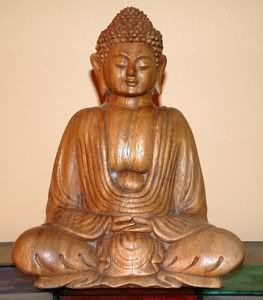One of the great benefits to me of maintaining this blog is that I discover books I had forgotten I had in the process of looking for passages on meditation topics to share with you. Today I'm at home and I discovered a book on my shelves called Precious Solitude: Finding peace and serenity in a hectic world by Ruth Fishel. I've given you the Amazon link to the book here because there are several reviews there that you might like to read.Solitude is such a potential thing. We hear voices in solitude we never hear in the hurry and turmoil of life. We receive counsels and comforts we get under no other circumstances.
-- Amelia Barr
Here is the passage I thought I'd offer today:
Body awareness truly does help with mindfulness. This is why, at the Center, we begin class with simple stretches. This is why it's good to perform the ritual prostrations before meditation. Both help us bring relaxed attention to our bodies and, as a result, remind us that we're in the present moment. And yes, the overall benefit regarding stress reduction is wonderfully valuable as well.When you feel as if you are about to explode from stress of obsessive thinking, take some time for yourself! Meditate. Become aware of your breath as it goes in and comes out of your nose. Take one minute and see how many times you do breathe in and out in a minute. Practice some yoga exercises. Get in touch with your body as it pulls and stretches. Take a walk and feel the muscles in your legs and the swing of your arms. Lie down and feel your body pressing against the rug or the floor. Mentally scan over your body, bringing your attention to your entire body from the top of your head down to the bottom of your feet.
These are just a few ways we can take time to release stress and stop the endless chatter that goes on in our minds. Simply by bringing our attention to our bodies, we can achieve instant relief. The peace we experience will stay with us long after we have returned to our daily activities.













